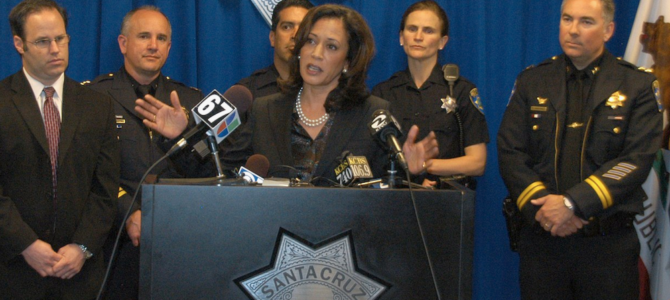
It is well documented that Kamala Harris, as the attorney general of California from 2011 through 2016, did little to bring about meaningful change to the way police officers are able to use deadly force.
During her tenure as the chief law enforcement officer of the state, Harris carefully displayed the right amount of sympathy and understanding for both sides of the debate, allowing her to claim she was taking steps to reform the criminal justice system from within.
A closer review of Harris’s actions during this time, however, paint a picture not so much of a pragmatic reformer out to reestablish the criminal justice system in new and more equitable ways, but more of a calculating, Clintonian-style politician who didn’t want to get caught on the wrong side of a volatile issue, especially when campaign donations were on the line.
This was especially evident through Harris’s silence and implied opposition to Assembly Bill 86, which would have required police shootings to be independently reviewed by the attorney general. Although Harris claimed she had practical concerns about the effect of AB-86, it’s likely she was more worried about how it would affect some of her strongest backers.
Harris Didn’t Support AB-86
In 2015, Democratic Assemblyman Kevin McCarty introduced AB-86, which would have taken the review of police shootings away from local prosecutors, giving it instead to the California attorney general. Many organizations and academics had begun to argue that the status quo created a situation fraught with bias and conflicts of interest, one from which many local prosecutors would have a hard time extricating themselves. AB-86 would have saved local prosecutors from the difficult, and likely unpopular, decision of handing the case to the state, where local police would be less likely to receive a sympathetic review.
AB-86 was supported by the American Civil Liberties Union, the California State NAACP, the Friends Committee on National Legislation, and the National Association of Social Workers, among other groups. It was strongly opposed, however, by various law enforcement and district attorney associations, including the California Association of Highway Patrolmen, the California District Attorneys Association, the California Police Chiefs Association, and the Peace Officers Research Association of California.
Then the state attorney general, Harris did not take a position on the bill, even though her office had supported and sponsored numerous other items of legislation throughout her tenure. Her silence on this matter was largely understood as opposition, thus helping to kill the bill in the Assembly suspense file, which is where Assembly leadership sends problematic, contentious bills to die, ostensibly for financial reasons. Bills in the suspense file are simply held there indefinitely by order of the chair of the Appropriations Committee, without ever being given a formal vote on the floor.
AB-86 would have caused intense discomfort for some of Harris’s biggest campaign donors, such as the police officers’ unions and law enforcement organizations that contributed heavily to her campaign for attorney general. A review of the data pulled from the California secretary of state’s website, which tracks campaign contributions, shows that from 2010 to 2016, Harris received well more than $100,000 in campaign contributions from law enforcement sources, including the Association of California Highway Patrolmen ($27,200), the Police Protective League ($20,100) and the Peace Officers Research Association of California ($32,200).
In considering this legislation, Harris likely performed a cost-benefit analysis and realized that, at that moment, protecting the interests of law enforcement would provide more tangible benefits for her going forward than any substantive reform to the way law enforcement professionals apply deadly force. This is likely why her office chose to remain silent on AB-86, as well as SB-227, which removed the ability of local prosecutors to refer cases involving police shootings to grand juries.
It is also worth noting that in 2007, Harris sat on the board of directors for the California District Attorneys Association, which came out then in formal opposition to SB-1019, a bill that would have made police officer disciplinary hearings open to the public. This occurred a few years before Harris ran for attorney general, but it bolsters the argument that over the course of her career, Harris has consistently shown more interest in protecting law enforcement from increased oversight and transparency than in reigning in serious abuses.
Her Record Speaks for Itself
When CNN’s Jake Tapper pressed Harris on her refusal to support AB-86, she attempted to defuse the problem but gave such an odd and incoherent answer that the Washington Post rated it entirely false. Harris claimed she could not weigh in because she was tasked with writing legislative summaries for pending ballot measures.
This reply grossly conflated her duties as attorney general and had never prevented her from weighing in on and supporting other items of legislation. In all likelihood, this answer was simply a pretext and an attempt to divert Tapper from probing deeper into her reasoning.
It’s clear Harris never took much interest in making any meaningful changes to the criminal justice system and the handling of law enforcement cases — at least not until it became politically necessary for her to do so. She certainly paid lip service to the idea of making improvements in this area, and even helped support a few relatively anodyne pieces of legislation that seemed to take steps toward remediating the problem. On the whole, however, going back as far as 2007, it’s clear Harris had no strong desire to work toward real reform.
When given the chance to take substantive, lasting steps, Harris balked — likely because of her dependence on the endorsements and campaign contributions from those in law enforcement. Like her running mate, she had years to work toward meaningful reform, and she failed. What makes anyone think she’ll do it as vice president?
This author is a California-based public policy professional.









